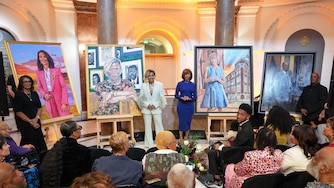Emory Knode considers himself born into music.
His birth certificate lists his father’s occupation as “musician.” Knode strums a little guitar, yes, and knows his way around the trumpet, sure.
But his true talent lies in repairs. If anyone can mend a busted guitar or restore an early 20th-century mandola, it’s Knode.
The 67-year-old operates one of Baltimore County’s oldest music stores: the Appalachian Bluegrass Shoppe. He likes to refer to the shop as a hospital for generations of abused, neglected and splintered acoustic “patients” painstakingly repaired by Knode and his band of string instrument craftsmen, aka luthiers.
“It’s pretty cool when they come and they’re smashed up,” Knode said. “It’s kind of like the ER when they’re flown in and it’s dying, you know, and you can put it back together and make music again.”
A Catonsville native, Knode got hooked on bluegrass as a young man. When he took over Nelson Knode’s Music Center from his father in 1980, he changed the name to Appalachian Bluegrass Shoppe. It’s since become a mainstay on Frederick Road in town.
“I picked ‘A’ because back in the day we had yellow pages and being in front of the yellow pages was important,” he said. “And Appalachian and Bluegrass came together just kind of fine and dandy.”

Operation (acoustic version)
On any given day at Appalachian Bluegrass, roughly 15 or so instruments are in for repairs, Knode said. They range from guitars to ukuleles, fiddles and mandocellos to taterbugs — the nickname for a bowlback mandolin that resembles the insect.
“I’ve repaired instruments I couldn’t even pronounce,” Knode said.
Inside the repair shop’s second floor, Knode compared the careful practice of replacing a guitar’s frets — the thin nickel or brass bars on the neck — to open-heart surgery.
“People see you go after a multi-thousand-dollar instrument with a hammer,” he joked. “It’s like they see a doctor go after you with a saw.
Read More
“It’s important to be super accurate,” continued Knode, gesturing to Nick Trossbach, who nestled the neck of a guitar on top of a lead shot bag to absorb the shock of hammering the frets back on.
Trossbach, who’s been with Appalachian Bluegrass for seven years, attended a luthier school out west to learn how to build and repair stringed instruments — a craft, Knode said, threatened by the mass production of musical instruments.
A missing note
Over the years, the music business has changed fundamentally, Knode explained.
“At one point it was nothing but fun,” he said. “Now it’s all emails and texts, and the personal side seems to have evaporated for me.”
As the owner of a 60-year-old institution, Knode is acutely tuned into how the buying climate and consumers’ values have shifted when it comes to supporting small businesses.


It’s much easier to replace in-store, personal service with the convenience of online shopping, but Knode tries to educate a new generation of musicians that convenience doesn’t equate to quality.
“What’s sad is folks don’t know what they’re missing,” he said. “You try to win the ones over that you can.”
Sam Guthridge, a local bluegrass musician, teaches banjo lessons at Appalachian Bluegrass. He explained there are folks who come to the store, try a bunch of instruments and then buy something off the internet.
The 44-year-old bought his guitar from the shop and said the experience is incomparable to clicking “check out” online.
“There were four identical guitars, and I got to try all of them for a couple months,” Guthridge said. “And then, one was special. ‘Cause there’s no two pieces of wood that are alike.”


Knode’s late wife, Charlene, used to run the sales floor and connected the shop with the larger bluegrass community in Maryland and across the far reaches of the globe.
“We worked in concert together,” Knode said. “The business misses her a lot. I don’t know what the future is going to bring.”
The couple’s two adult children, Emily and Christopher, aren’t interested in taking over the shop, and while Knode wants to take a step back at some point, he’d like to hand over the reins to someone he trusts.
“All books come to an ending,” he said. “One of my favorite sayings I always tell myself is ‘Never be sad that something’s over with. Just be really happy it occurred.’”

Mountain music’s Maryland ties
Bluegrass has roots in the Old Line State’s westernmost counties, where many Scots-Irish and English immigrants made their homes in the Maryland panhandle.
Knode attributes the genre’s rise in Baltimore to the region’s 19th-century industrialization.
“Back then we had Bethlehem Steel, we had Sparrow’s Point, we had the shipyards, we had lots of industry in the railroads, which brought a lot of these people from the country into the city for a job,” he said. “I mean, they write songs about this, you know? We were heavily steeped in bluegrass in this region.”
And while bluegrass has been around for hundreds of years and rose to prominence in 1940s America, new artists are finding ways to keep the genre relevant, including one of Knode’s favorite artists: Billy Strings.
“Good God, Billy Strings, he’s crossed all boundaries, you know?” Knode said. “Billy is just an amazing bluegrass musician who’s recorded with everyone from Willie Nelson to rappers [like Post Malone].”
During a bluegrass jam in Baltimore’s Hampden, Guthridge said that bluegrass is having a revival, partially, because so much modern music isn’t even made with instruments.
“People who are looking for a sound that feels more organic than that are going to gravitate towards something that’s made with acoustic instruments,” he said. “Just wood and wires.”

Back upstairs, on the shop’s third floor, Knode happily showed off another guitar-in-repair that used to belong to a veteran who took it to Vietnam during the war.
Before it was checked into the store, the guitar was in rough shape. The glossy shine on the neck and back of the instrument was destroyed, and there were large cracks on its side.
“When we’re finished with it, you won’t be able to tell,” Knode said with a laugh. “Abracadabra! People say, ‘How’d you do that? How’d you do that, Emory?’ and I’ll be real smug and I’ll say, ‘Abracadabra.’”
Knode knows that the real magic conjured inside the Appalachian Bluegrass Shoppe doesn’t come from a wave of fingers or a silly spell, but rather, the instruments he repairs and the musicians who play them.
“It’s just so cool,” he said, holding the guitar that survived a deployment across the world and back. “When you think this was used to entertain GIs when they were in the jungle.”





Comments
Welcome to The Banner's subscriber-only commenting community. Please review our community guidelines.